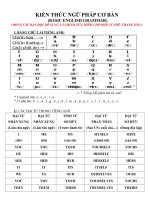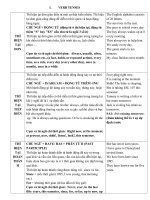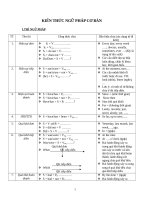Kiến thức ngữ pháp PHRASAL VERBS
Bạn đang xem bản rút gọn của tài liệu. Xem và tải ngay bản đầy đủ của tài liệu tại đây (198.01 KB, 4 trang )
PHRASAL VERBS (43 Phr. Vs)
I.
II.
III.
Form:
Phr. V = V + Particle(s)
e.g.: look after sb/sth; take (sth) off; look up to sb
Meaning: Literal and non-literal
Stand up; Look after
Kinds:
1/ Intransitive verbs (Vi) (Without Objects) (8 Phr. Vs)
-
Break down: stop working, especially cars (b
e.g.: The car broke down when we were on the motorway.
Drop out: stop before you finish (b cu c)
e.g.: Two of the runners dropped out half way through the race.
Get on: make progress (ti n b )
e.g.: Nina likes her new college, and is getting on well.
Get away: escape (tr n thoát)
e.g.: One of the burglars was caught, but the other got away.
Grow up: change from a child to an adult
e.g.: I grew up in a small town in Peru.
Set off/out: begin a journey (kh i hành)
e.g.: We set off early to avoid the traffic.
Take off: leave the ground and begin to fly (c t cánh)
e.g.: Our plane took off more than three hours late.
Turn up: arrive, often unexpectedly
n)
e.g.: We invited twenty people, but only five turned up.
2/ Transitive verbs (With Objects)
* Inseparable (Không th
c) (10 Phr. Vs)
- Call for sb: come to one’s house and collect sb
e.g.: We’ll call for you about 8.00, so please be ready.
- Call on sb: visit sb for a short time
e.g.: I called on Professor Jones and wished her a Happy Birthday.
- Deal with sth: take action to solve a problem (gi i quy t)
e.g.: Could you deal with this customer’s problem please?
- Get at sth : try to say sth, suggest sth (mu
ý)
e.g.: Helen couldn’t understand what her boss was getting at.
- Get over sth: recover from sth
t qua/ h i ph c)
e.g.: Peter was ill with flu, but he’s getting over it now.
(Correct this sentence: Peter was ill with flu, but he’s getting it over now)
- Head for sth: go in the direction of sth (di chuy
ng)
e.g.: The escaped prisoner is thought to be heading for London.
- Join in sth: take part in sth, contribute to sth
e.g.: He stared at them without joining in the conversation.
- See to sth: pay attention to sth, often meaning “repair”
a ch a)
e.g.: The brakes on your car need seeing to.
- Stand for sth: tolerate sth (ch
ng cái gì)// Put up with sb/sth
e.g.: I will not stand for so much talking.
- Take after sb: be similar in appearance or character ( Inheritance) >< Look like sb
(Appearance)
e.g.: Karen takes after her mother. They are very similar.
* Separable (Có th
c) (15 Phr. Vs)
- Bring sb up: look after a child until adult (1) ( nuôi l n)
(bring Tom up/ bring up Tom/ bring him up / bring up him)
e.g.: Tom’s aunt brought him up after his parents died.
- Call sth off: cancel (2) (h y)
e.g.: The school called off the match because of bad weather.
- Clear sth up: make sth clean and tidy (d n d p) (3)
e.g.: Could you help me clear up the room after the party?
- Cut sth/sb off: be disconnected during a phone-call (often in passive) (4) (ng t k t n i)
e.g.: I’d just got through to Dehli when I was cut off.
- Fill sth in/out: complete sth by writing
n)
e.g.: Could you fill this form in with all your details, please?
- Knock sb out: make sb unconscious (6) (làm b t t nh/ h g c)
e.g.: Bryson knocked his opponent out in the second round.
- Let sb down: disappoint sb (làm th t v ng) (7)
e.g.: Ann said she would help, but she let me down.
- Look sth up: find information in a reference book (tra c u thông tin) (8)
e.g.: I looked this word up in a dictionary and in an encyclopedia.
- Pick sb up: collect sb in a car
e.g.: The taxi will pick me up at 6.30.
- Put sth off: postpone sth (10) (hoãn)
e.g.: The weather was bad, so they put off the match for a week.
- Put sb up: provide sb with accommodation in someone’s house (11) (cho
nh )
e.g.: A friend in Prague put me up for a couple of nights.
- Take sth up: start a hobby or activity (12) (theo h c làm s thích)
e.g.: Sam has just taken up parachuting.
- Try sth on: put on clothes to see if they are suitable (13): (m c th , mang th
m th )
e.g.: I tried the coat on, but it was too big and the wrong colour.
- Turn sth on/off: begin or stop operating electrical equipment (14) (m /t t)
e.g.: Don’t forget to turn off the light before you go to bed.
- Wash sth up: clean plates, knives and forks… (r a chén bát…) (15)
e.g.: After the party, Martin washed up all the glasses.
3/ Verbs with three parts (Inseparable) (10 Phr. Vs)
-
-
-
-
-
-
Catch up with sb*: reach sb by going faster
i k p)
e.g.: You can rest now and catch up with us later./ You are going too fast! I can’t catch up.
Cut down on sth*: reduce the amount of sth
e.g.: Sheila has decided to cut down on holidays this year./ You’re eating too many sweets. You
should cut down.
Drop in on sb*: visit sb for a short time = Call on sb
e.g.: Let’s drop in on David while we’re in Paris./ The next time you’re nearby, please do drop in!
Get along/on with sb*: have a friendly/good relationship with sb
e.g.: James doesn’t get on well with his maths teacher./ We work in the same office, but we
don’t get on.
Keep up with sb*: move at the same speed as sb (duy trì t
)
e.g.: You’re going too fast! I can’t keep up with you./ Patty finds this class difficult, and can’t
keep up.
Live up to (one’s expectations…): be as good as someone expects (s
i)
e.g.: The film didn’t live up to our expectations.
Look forward to sth/ V-ing: be excited and pleased about sth that is going to happen. (mong
i)
e.g.: I’m looking forward to going on holiday this year.
Look out onto/over sth: have a view of sth ( tr
ng)
e.g.: Our hotel room looks out onto the lake.
Put up with sb/sth: accept sb/sth without complaining
e.g.: I can’t put up with all this noise/ these students.
Run out of sth*: have no more of sth (c n/h t)
e.g.: I think the car is about to run out of petrol!/ There isn’t any more milk. We’ve run out.







